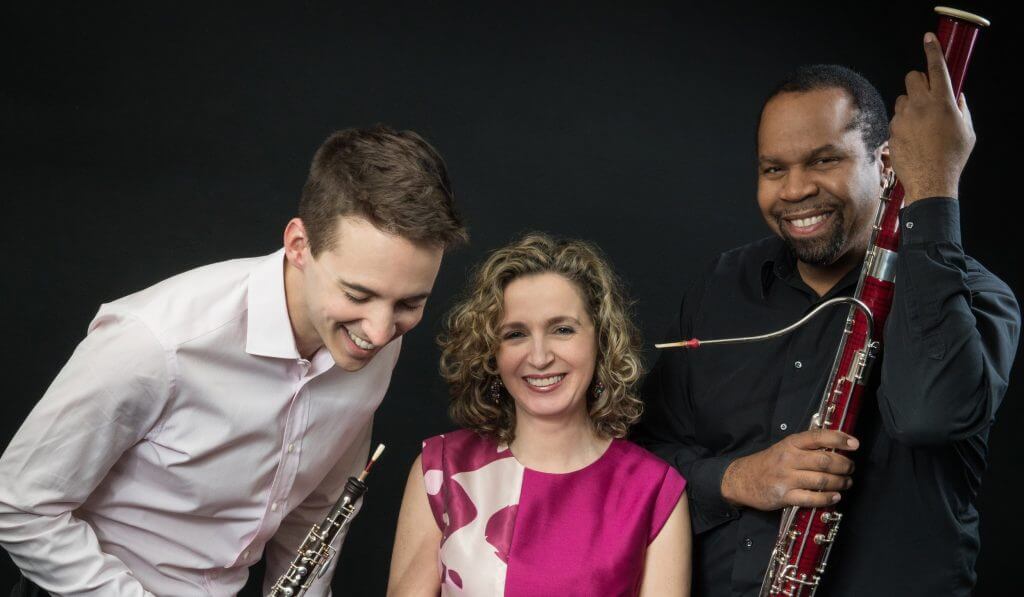
Poulenc Trio at Walter Hall, University of Toronto, Thursday, Oct. 4
Quick, name your favourite trio for oboe, bassoon, and piano! Ok then, name any trio for oboe, bassoon, and piano. Stumped? I am not surprised.
There is only one standard work for that combination of instruments, written by the French composer Francis Poulenc in 1926. That is why the chamber ensemble consisting of the oboist James Austin Smith, the bassoonist Bryan Young, and the pianist Irina Kaplan Lande call themselves the Poulenc Trio. Young and Kaplan Lande have been with the trio since its inception in 2003, whereas Smith is the third oboist of the ensemble, having joined it within the past year. Smith noted in his remarks to the audience that this recital for the Women’s Musical Club of Toronto, which marked the Toronto premiere of the ensemble, was also a homecoming of sorts for him, as his mother is from Scarborough.
In over 45 years of concert going, this was the first time I have heard an entire recital of works for this combination of instruments. Come to think of it, it may be the first time I have listened to even a single piece for oboe, bassoon, and piano, never mind an entire recital. After hearing the Poulenc Trio perform, it is a mystery to me why this combination has not been more popular with composers. After all, it is the double reed equivalent to the standard piano trio ensemble of violin, cello, and piano. Double reed players should launch a discrimination lawsuit against the composers of the world for this unfair and clearly unwarranted neglect.
I am not sure how the Poulenc Trio sustains their concert giving activity, given the limited repertoire available. They fill out their programs with transcriptions and commissions, but even so, judging by reviews of their past concerts, the works heard in the WMCT recital form their core repertoire. You would think that they must be tired of playing the trio by Poulenc, a characteristic product of the neoclassical movement of the 1920s and its preference for the dry sonorities of wind instruments. But no, their performance was fresh and invigorating, by turns witty, deeply felt, and cheerful, giving the full measure of this work in which Poulenc achieved his maturity as a composer. It was the high point in the program, and if the other works paled by comparison to the Poulenc, nevertheless the recital was imaginative, varied, beautifully played, and cleverly presented throughout.
The newest work on the program, Trains of Thought, was written for the Poulenc Trio by the young US composer Viet Cuong (b. 1990), a doctoral student in composition at Princeton. A whimsical animated film created by the artists Elizabeth and Alden Phelps accompanied the energetic score (the film was created after the music). The film features birds, trains, a cityscape, and various 2D people, one of whom was lifted up by an enormous hand (à la Monty Python) and then transformed into the only 3D character in the cartoon. Despite the lack of any narrative content, this quirky film and energetic score combined to make for an enjoyable experience.
The works by Schnittke (an arrangement of his Suite in the Old Style, originally for violin and piano) and Glinka (his Trio pathétique, originally for clarinet, bassoon, and piano) were much less satisfying musically to this listener, despite the fine performances. The Schnittke work was cobbled together from some of his film music. It is by turns cheeky and languid, but in a rather insipid and generic eighteenth-century pastiche idiom that lacks the brilliant touches that a Stravinsky or Poulenc would have brought to such an exercise. The Glinka is an eminently forgettable work that apes the most florid and superficial elements of the Italian operatic style of the early nineteenth century; it is all style and no substance, apart from the all too brief last movement, which shows signs of deeper feeling but is over before it has begun.
Two nicely contrasted arrangements of music by Shostakovich, and an eclectic and high-spirited movement from a trio by André Previn, brought the first and second half of the program respectively to a rousing conclusion. Smith joked that one of his teachers advised him that all oboe recitals should begin with an announcement about where the emergency exits are located. And so it is a pleasure to report that the fine ensemble work of the Poulenc Trio in this varied program was greeted with a standing ovation, rather than a stampede for the exits. The trio offered an arrangement of a Charlie Chaplin tune from his movie Modern Times as an encore; not his beautiful song “Smile” from that movie, but rather a short and sweet number titled “Lavish entertainment”.
[Disclosure: Robin Elliot is the coordinator of the Tuning Your Mind pre-concert talks for the WMCT]
- SCRUTINY | Beethoven’s ‘Ghost Trio’ Highlights Intriguing Mixed Program By Montreal’s Trio Fibonacci In Toronto Return - October 4, 2019
- SCRUTINY | Poulenc Trio Shows Us Why The World Needs More Oboe, Bassoon, And Piano - October 5, 2018
- SCRUTINY | Peter Oundjian Gives A Sterling “Thank You” To Toronto - June 22, 2018



